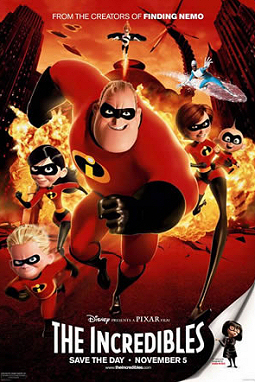
Links Movie Summary
The movie starts off with a flashback to when Mr incredible and Elastigirl just got married and were still fighting crime. Soon after the government decides to ban superheros from helping because the super heroes tend to cause a lot of damage. The movie then skips ahead 15 years to when Mr Incredible and Elastigirl have a family. Mr. Incredible is working a boring 9-5 job and is missing the glory days. Then Mr. Incredible gets offered another superhero job and jumps on it. He is tasked to hunt down and stop a giant AI powered robot known as the omnidroid. After the omnidroid is defeated it is revealed that the bad guy, Syndrome, wants to eliminate all the superheros. Syndrome's master plan is to send his omnidroid into the city to cause mayhem and then swoop in with his inventions to save the day and become famous, and then sell his inventions to the public so that everyone can have super powers. This naturally goes wrong and the Incredibles have to save the city from the Omnidroid. This fight ended with the superheroes saving the city and the public wanting to reinstate them as crime fighters.
Film Makers IntentThe makers of The Incredibles try to convey technology in a skeptical light, and tend to focus on the harms that technology can bring about, with very little benefits mentioned. Throughout the movie technology was vilified, or brought down. The most prevalent example was the omnidroid and how it malfunctioned and destroyed the city. This display of unreliability helped to advance the directors case that technology shouldn’t be trusted. This was reminiscent of the time period the movie was made, since it was released 2 years after the dot com bubble burst [1]. This burst led to a public distrust of software and software companies. Since people were already skeptical of all this new technology it was natural for the filmmakers to mirror that fear through Syndrom and the Omnidroid. Technology was also viewed as inferior compared to human ability. This was shown through the fact that in the end, it was the naturally talented superheroes that defeated the Omnidroid and Syndrome, Syndrome of which was trying to be a superhero through his technology rather than natural talent. Overall this film tends to view technology as inferior, unreliable, and tools for bad actors, and doesn’t focus on the good that can be accomplished through technology, and instead advocates for the superiority and good will of humans over technology.
1) Adam Hayes, (7/25/2019), Dotcom Bubble, https://www.investopedia.com/terms/d/dotcom-bubble.asp
Societal ConclusionOur team’s conclusion about The Incredibles is that technology is the great equalizer, but it needs to be monitored accordingly. Technology gives a more equal access to the basic needs of people. For example, inventions like eyeglasses seem ubiquitous today, but glasses that treat nearsightedness have only existed since the 15th century [1]. Another example is the world wide web. It gives anyone with an internet connection the ability to access a surplus of information that they wouldn’t have had otherwise. By having access to technology, people are brought on an equal footing with those who didn’t have the same difficulties. This is effectively Syndrome’s point of view and goal in the movie.
Syndrome views normal humans as extremely disadvantaged when compared to superheroes, and resents the heroes for it. By creating and distributing “super” technology, it would make it so that no one has an advantage over anyone else when it comes to powers. In theory, this would be an amazing boon to society. For example, the zero point energy gloves created by Syndrome would have an array of real-world benefits, like being used for construction, as you wouldn’t need a crane to lift heavy objects like steel beams. Other inventions like the rocket boots would also be valuable, as people could fly around instead of having to walk or drive anywhere. That being said, this access comes with risks.
When so many people have access to such robust technology, there are some inherent dangers. A similar parallel is with the gun debate in the United States today. If everyone is given equal access to such a dangerous and deadly tool, it becomes increasingly difficult to prevent the misuse of them. Another example comes from the question of internet anonymity. Many people believe private access to the internet should be a right, but that power is misused by many others for illicit activities like purchasing drugs.
The super technology would have the same drawbacks. Such power can be mishandled severely, and because of that, there would need to be some form of regulations made to control the tech. The government would need to ensure that too powerful of technology wouldn’t be released to the mass public, and would also need to set penalties for the misuse of the tech. This would at least help to mitigate the adverse effects of this super tech being released to the world.
1) Jacewicz, Natalie. What Did Nearsighted Humans Do Before Glasses? 7 July 2016, www.npr.org/sections/health-shots/2016/07/07/484835077/what-did-nearsighted-humans-do-before-glasses